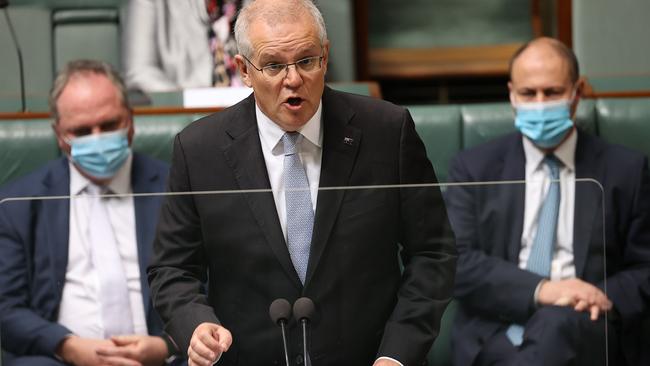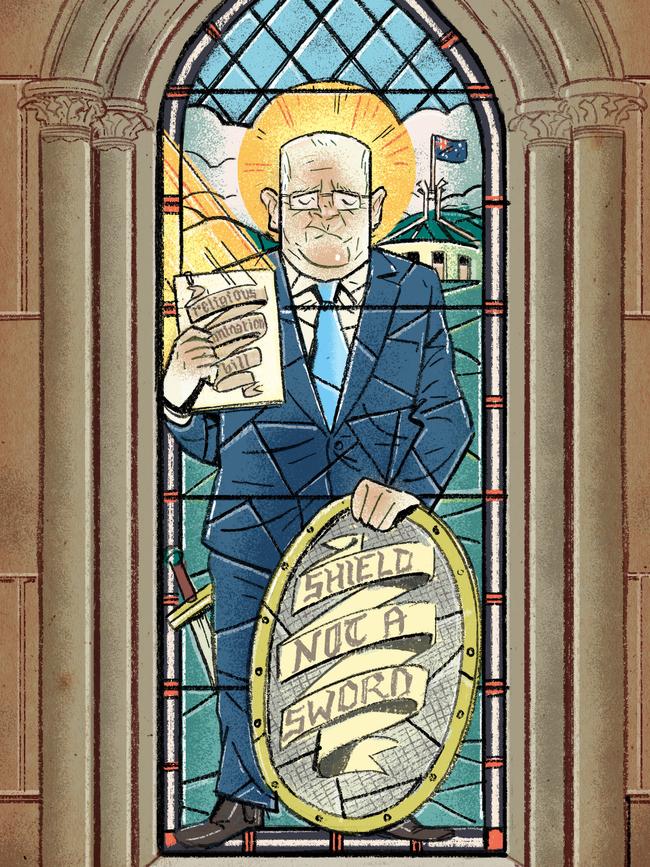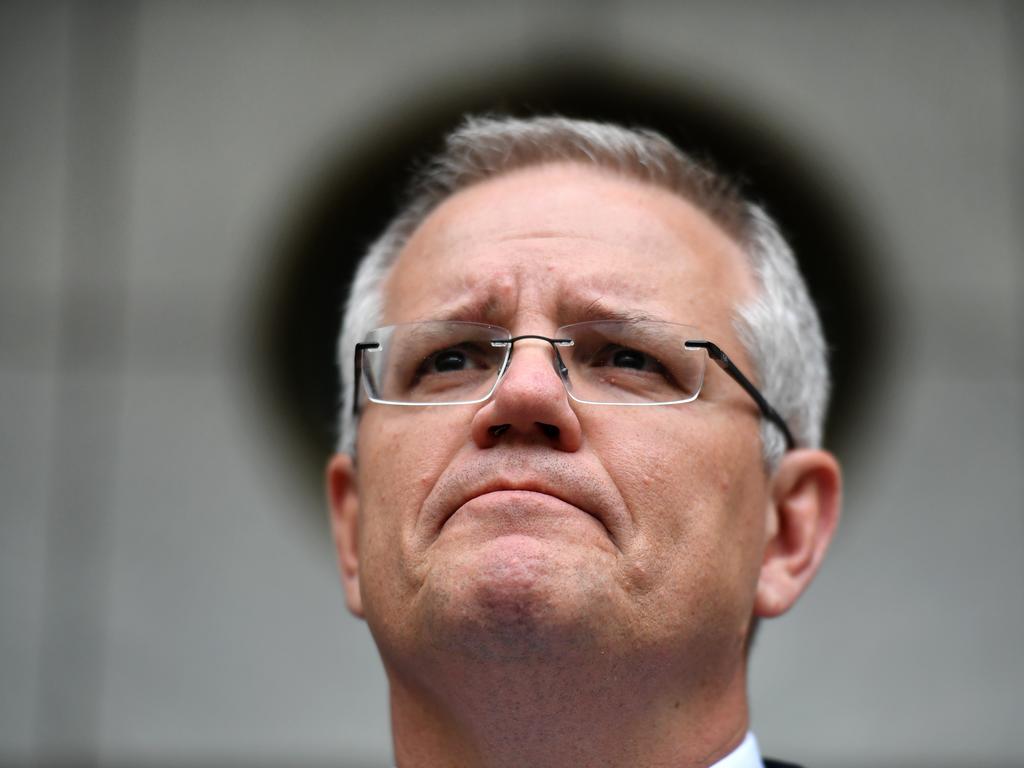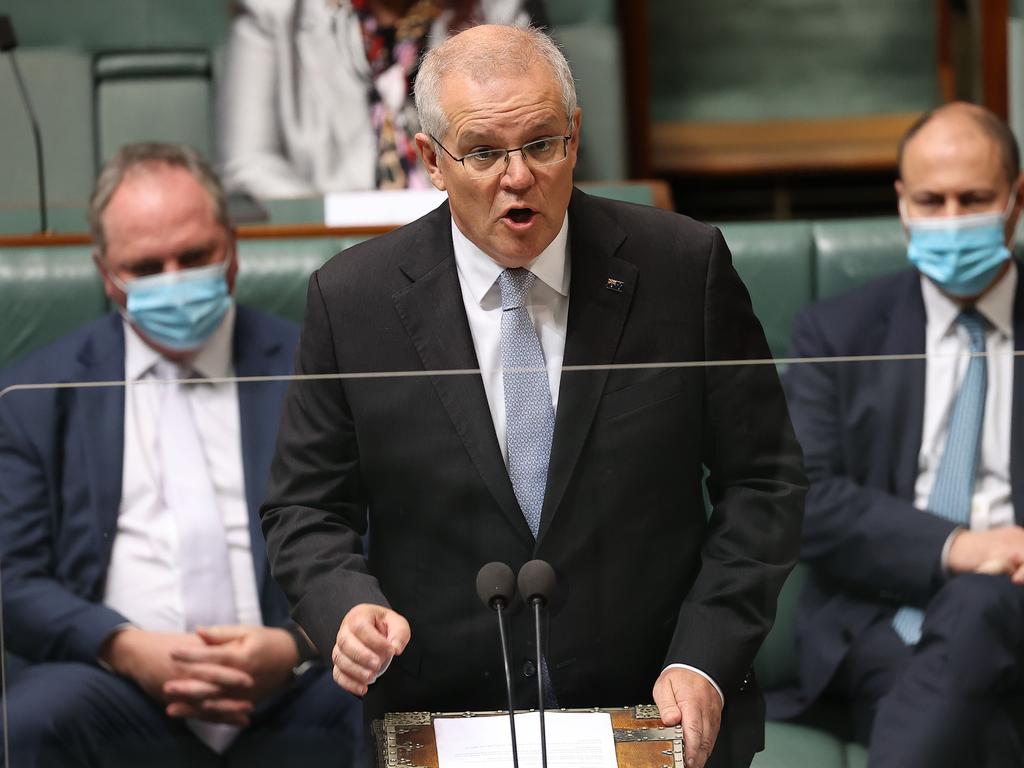Morrison appeals to higher order with religious discrimination bill
In protecting religious freedoms, the PM must also restore Coalition unity.

By personally introducing the bill, Morrison has elevated the stakes. He needs this measure passed into law before the 2022 election to honour his 2019 pledge – and if this bill fails, then Morrison will hang this defeat around Labor’s neck in every religious-based marginal seat in the country.
This bill has a triple significance. It seeks to address the known inadequacy in our laws on religious freedom; it tests whether the Coalition can deliver on a fundamental element of conservative belief – or fold before that task; and it will reveal whether the Australian parliament at a time of profound cultural division is capable of denying discrimination against religion in an age dominated by anti-discrimination.
This debate will test Morrison’s assertion that for many Australians “religion is inseparable to their culture” since “they are one and the same”.
Is this true? And if so, for how many? A majority or a minority? This sits with Morrison’s further claim that in a liberal democracy, “faith and freedom” are fused together.
The bill’s fate will tell a lot about modern Australia. Its purpose is to shift the status quo and strengthen the law around religious freedom. There is substance here but even more symbolism. The timing cannot be ignored – Morrison puts this question before an election where he will be either endorsed or repudiated as PM.
Morrison’s immediate problem is to hold his own side together behind the bill given the shambolic display this week from the Coalition and multiple crossings of the floor. Morrison warned the partyroom that indiscipline could spell election defeat. But the deeper problem is the conflict over values and policy now undermining the Coalition.
With conservatives at the start of the week rebelling over vaccination mandates, the progressives flexed their muscles at the end of the week complaining about the National Integrity Commission and the religious discrimination provisions.
Despite the government chaos, religious discrimination is a far more challenging and dangerous issue for Labor.

Under Anthony Albanese, Labor must decide whether to retreat from its stance in the previous parliament when Labor consistently prioritised LGBTIQ rights over religious freedom.
The 2019 election disillusionment of faith-based communities with the Labor Party was grounded in reality. During the 2016-19 parliament, Labor deepened its commitment as a progressive party, backed bills threatening the freedom of religious schools, and saw then leader Bill Shorten’s declaration that LGBTIQ students and “discrimination against kids” was Labor’s No.1 issue.
Labor is going to be torn by conflicting pressures over this bill. So far under Albanese’s leadership, Labor has preferenced electoral pragmatism in its policy rollout but religious freedom is different – it is an incendiary issue for much of progressive politics.
The campaign against Morrison’s bill will be intense, with Equality Australia already calling for the bill to be rejected. Its chief executive Anna Brown said the bill would allow a medical worker to tell a person with HIV that AIDS “is a punishment from God” and that “disability is caused by the devil” – claims the government rejects, but they point to an emotionally fraught debate.
The group disputed Morrison’s emphatic claim that the bill does not diminish the rights of others. And Greens spokesperson Senator Janet Rice called the bill “a Trojan horse for hate” and said it would assist bigots and divide the country.
The smart course for Albanese will be to support the bill, though Labor can be expected to move amendments. It needs to curb the 2019 concern, as expressed by Chris Bowen, that “people of faith no longer feel that progressive politics cares about them”. The Greens don’t need to worry about that, but Labor does.
Many progressives, however, assert the bill addresses a non-existent problem. Such people couldn’t be talking to faith-based communities where the sense of worry or threat is palpable. Labor will run a high risk if it votes down the bill or is seen to be the author of its failure to pass.
The bill will be referred to a parliamentary committee but the government needs a deadline for a report by early February. This is essential to assess the report, make any amendments and force the issue to a vote before the election, still expected in May. The test for the parliament and country is whether – after past failures – a pathway can be found between the competing needs of religious freedom and minority rights. There are no guarantees on that front.
In making his case, Morrison said: “The commonwealth has a Sex Discrimination Act, a Racial Discrimination Act, a Disability Discrimination Act and an Age Discrimination Act. However, there is no standalone legislation to protect people of religion or faith against discrimination.”
This bill will test the government’s capacity to mount a persuasive argument. Its deliberate reluctance this term to join the battle of ideas, outside the economy and security, has been a blunder. Religious freedom is a saleable position but the government has been slow to the issue.
Even more conspicuous has been Morrison’s refusal to engage on the National Integrity Commission when the logical position was to campaign for a model short of the “show-trial” NSW ICAC with its multiple and long-documented abuses of power and process.
It is incredible that only on Thursday last week did Morrison – after surrendering this issue to progressives for an entire year – launch a belated assault on the NSW model long favoured as the basis for a federal ICAC.
Given the NSW experience, the potential damage this model could do to national governance might be significant.
In his speech, Morrison highlighted some civilisational truths – the state and the market alone cannot deliver the “good society” that people crave and that efforts to shut down faith are ultimately counter-productive.
Morrison criticised cancel culture in Australia, warning “it’s there” and “it’s real”. He said people of faith should not have to fear being abused and harassed for their faith. He warned that values of “tolerance” and “diversity” had been recruited against many religions and it was vital to veer away from “artificial, phony conflicts, boycotts, controversies and cancelling” created by bigots and bullies. This suggests he might campaign aggressively for his cause.
But Morrison is going to encounter opposition from a difficult quarter – state governments, not just Labor but Liberal as well. The bill, as Morrison said, will override state and territory laws whose discrimination provisions are inconsistent with the federal position.
Wait for the outcry from Victoria followed by other states, including the Liberal government of Tasmania. The states operate as masters of their own domain on anti-discrimination law and are unlikely to tolerate federal overrides. This looms as a political obstacle and a potential constitutional question. The point, however, is that the states have only themselves to blame.
NSW and South Australia, as Morrison said, have no religious discrimination laws. The Andrews government is Victoria is proposing a tightening of the discretion exercised by religious schools.
Executive director of the National Catholic Education Commission Jacinta Collins told Inquirer legislation proposed in Victoria “is likely to generate lawfare for our schools”.
Teachers might claim they are being discriminated against for their sexuality when the issue is their refusal to support the school’s religious ethos. “We do have gay teachers but faith-based schools should expect staff to respect their faith-based ethos,” Collins said. “The purpose of a Catholic school is to have a Catholic school.”
While both Coalition and Labor support the principle of allowing religious schools to hire staff that reflect their ethos, this principle is under assault from much of progressive politics where it is upheld in words but undermined in action. The bill ensures religious educational institutions, charities and religious not-for-profits are protected in advancing their faith ethos.
Liberal MPs Trent Zimmerman (North Sydney) and Senator Andrew Bragg (NSW) refused to commit this week to voting for the bill. One of their main concerns, shared by other Liberal MPs, is the delay in implementing the government’s separate pledge to amend the Sex Discrimination Act to protect gay students and teachers from removal or dismissal. The government has asked the Australian Law Reform Commission to report on this issue, but that report is a full year away.
Morrison is pledged to change the law to protect gay students and teachers. “Gay students should not be expelled from religious schools nor should gay teachers who have been employed at those schools be dismissed if they are gay,” Morrison said. But Morrison has declined to change the timetable.
“I just think we need to get on with this,” Bragg told the ABC. “People who are gay are being sacked as teachers today in NSW and in Australia. I just think we can deal with these things together.”
Zimmerman said there was no reason for the delay.
This is the position taken by ALP Senate leader Penny Wong, which must be a pointer to the stand Labor will adopt. Wong said the test for Morrison to show he was “genuine” was “to deliver all of his overdue promises at the same time”. Labor can be expected to make this an issue.
The bill sensibly abandons the previous so-called “Folau” provision designed to prevent employers taking action against individuals on the basis of their religious-inspired comments. But it enshrines a “statement of belief” provision, saying such statements in and of themselves do not constitute discrimination under federal, state or territory law – the point being current laws are overridden. This has inflamed progressive and legal opinions.
Attorney-General Michaelia Cash told Inquirer that for a statement to be protected under the bill “it must be of a religious belief held by a person, made in good faith and a belief that the person genuinely considers to be in accordance with the doctrines, tenets, beliefs or teaching of that religion”. The bill does not protect statements that are malicious or that a reasonable person considers would threaten, intimidate, harass or vilify a person and group. The purpose is to ensure that genuine statements of religious views may be expressed without legal repercussions.
Equality Australia has attacked the provision, saying its purpose is to “allow people to say, write and communicate things which could be discrimination today” – the point being it rejects changes giving more tolerance for religious freedom.
Equality Australia says the proposed law may protect a boss, colleague, doctor or service provider saying things such as “disability is caused by the devil” or “HIV is a punishment from God”.
But this seems a deliberate stretch too far. What religion says disability is caused by the devil? How could this meet the “good faith” requirements in the bill? Surely it infringes on threatening or harassing the person. As for the HIV remark, a nurse saying this to a patient would manifestly fail the “good faith” requirement and probably fail other tests in being malicious or intimidatory.
But there is no doubting the fine line involved. The explanatory memorandum deals with the case of Terrance, an atheist, who on an occasion tells his colleagues he thinks prayer and belief in God are “illogical” thereby offending Meaghan who is religious. In this case, Terrance’s remarks are a statement of belief and therefore not discrimination. But if Terrance made repeated remarks along these lines to Meaghan, then “it may be possible to demonstrate that these comments are not being made in good faith”.
The bill deals with the issue of direct discrimination when someone is treated less favourably because of their religion or religious activity. Take the example of Anthony, a Catholic priest wearing a clerical collar who is denied entry to a restaurant by Margaret, an agnostic who does not want clerical dress on her premises. Anthony could take action as the subject of direct discrimination.
Momentum for this bill originated in passage of the same-sex marriage law in 2017 when numerous efforts by conservatives to protect religious freedom were defeated on the floor of parliament by a determined ALP and groups of Liberal progressives. This led to the religious freedom review led by former minister Philip Ruddock, whose recommendations included the option “to enact a Religious Discrimination Act to render it unlawful to discriminate on the basis of a person’s religious belief or activity”.








Scott Morrison has tied his authority, standing and conviction as Prime Minister to the religious discrimination bill – a measure that, while belated, is fundamental to Morrison’s personal vision of a nation that protects faith-based and multicultural communities.